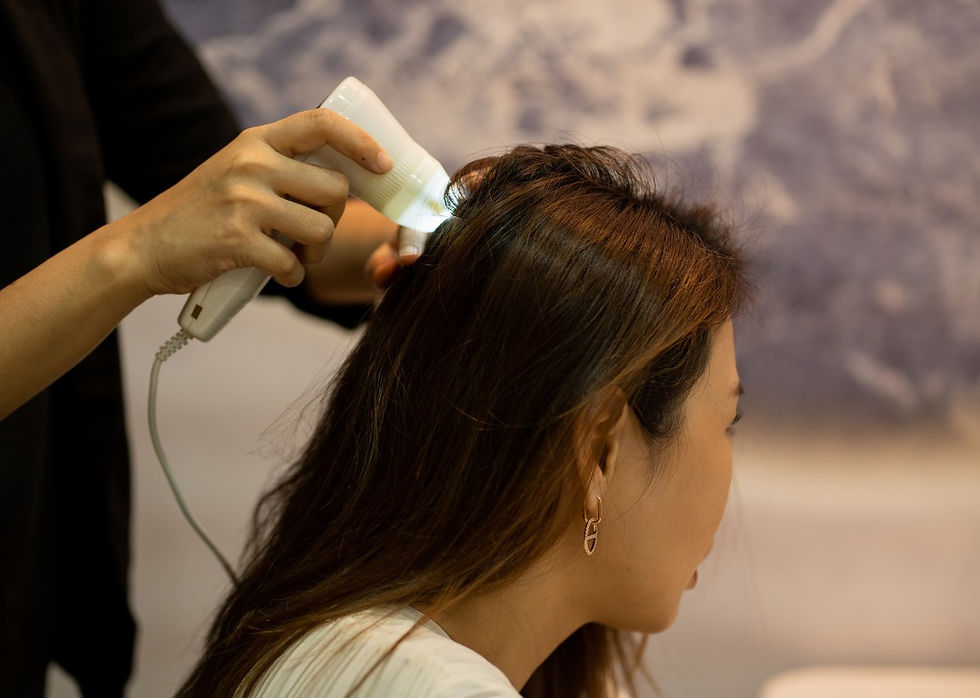Malaysia TCM Hair Care | Understanding the Real Causes of Hair Loss
- Carmen Lim
- Feb 27, 2024
- 3 min read
When we notice our hair falling out more and more, we can't help but feel alarmed and worried. Hair is a part of our body and an important component of our appearance. Sudden hair loss can not only affect our physical appearance, but also our confidence and mental health. Therefore, we must understand the reasons for hair loss in order to take appropriate preventative and treatment measures.
Hair loss is a common problem, but there are many ways to prevent and treat it. In this article, we will explore the causes of hair loss and possible solutions.

There can be various reasons for sudden hair loss, and here are some common ones:
High stress: When the body is under stress, it releases a hormone called cortisol, which can cause hair thinning and shedding.
Side effects of certain medications: Some medications (such as antibiotics, cancer drugs, thyroid medications, etc.) may lead to hair loss.
Hormonal changes: Hormonal changes can lead to hair loss, such as women experiencing this after pregnancy, childbirth, or stopping birth control pills.
Nutritional deficiencies: Lack of important nutrients (such as protein, vitamin B12, iron, etc.) in the body may cause hair loss.
Autoimmune diseases: Certain autoimmune diseases (such as psoriasis, systemic lupus erythematosus, etc.) may cause hair loss.
Traditional Chinese medicine theory believes that hair growth is closely related to the body's qi and blood condition. If the body's qi and blood circulation is not smooth or insufficient, it can lead to sparse or falling hair. Therefore, traditional Chinese medicine treatment can help with hair loss, and here are some methods of traditional Chinese medicine treatment for hair loss:
Acupuncture: Acupuncture can stimulate blood circulation in the scalp,
increase the nutrient

supply to the hair, and adjust the body's qi and blood circulation to help hair growth.
2. Chinese herbal medicine treatment: Chinese herbal medicine can improve the hair growth environment by regulating the body's qi and blood condition. For example, Chinese herbs such as black sesame, mulberry, angelica, and polygonum multiflorum can help improve hair quality.
3. Tuina: Tuina can promote blood circulation in the scalp, increase the nutrient supply to the hair, and also relax the body's tension and relieve stress.
4. Dietary therapy: By changing the diet structure and supplementing the nutrients needed by the body, such as protein, iron, zinc, and vitamins, it can promote hair growth.
In summary, traditional Chinese medicine treatment can help with hair loss by adjusting the body's qi and blood condition and improving the hair growth environment. However, the treatment methods for hair loss vary from person to person and require comprehensive treatment based on individual conditions. If you are experiencing hair loss problems, please consult a professional traditional Chinese medicine doctor and follow their guidance for treatment.

To understand one's own scalp problems, it can be determined through scalp testing. Here are some common methods for testing the scalp:
Visual inspection: First, carefully observe your scalp to see if there are any problems such as dandruff, itching, redness, hair loss, as well as the density and quality of your hair.
Oil drop test: Apply a few drops of plant oil onto the scalp and gently massage for a few minutes, then rinse with warm water. If there are symptoms such as greasiness, flakes, and itching, there may be problems with dandruff or excessive oil secretion.
pH value test: Use a pH meter to test the acidity and alkalinity of the scalp. The normal pH value of the scalp should be between 4.5-5.5. If the pH value is too high or too low, there may be problems such as scalp allergies or dryness.
Scalp microscope examination: This is a professional method for testing the scalp, which can observe the growth state of hair follicles and hair, and determine whether there are problems such as folliculitis or hair loss.








Comments